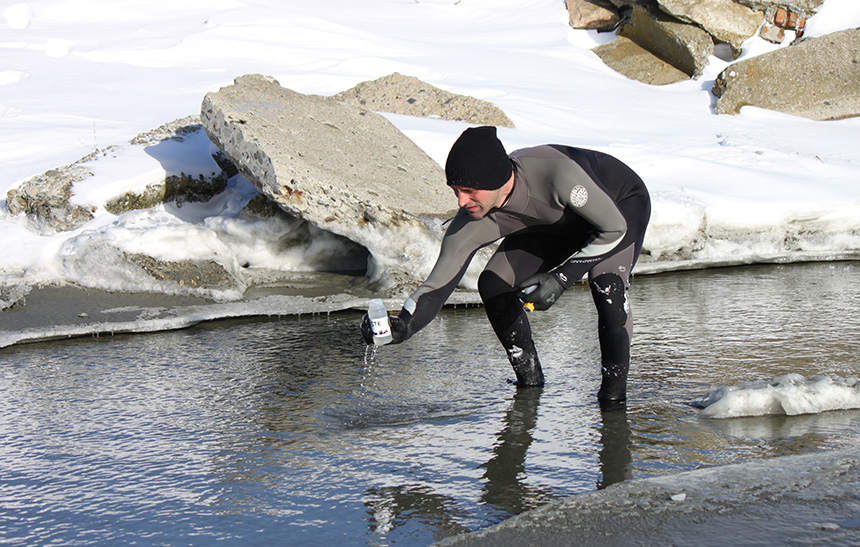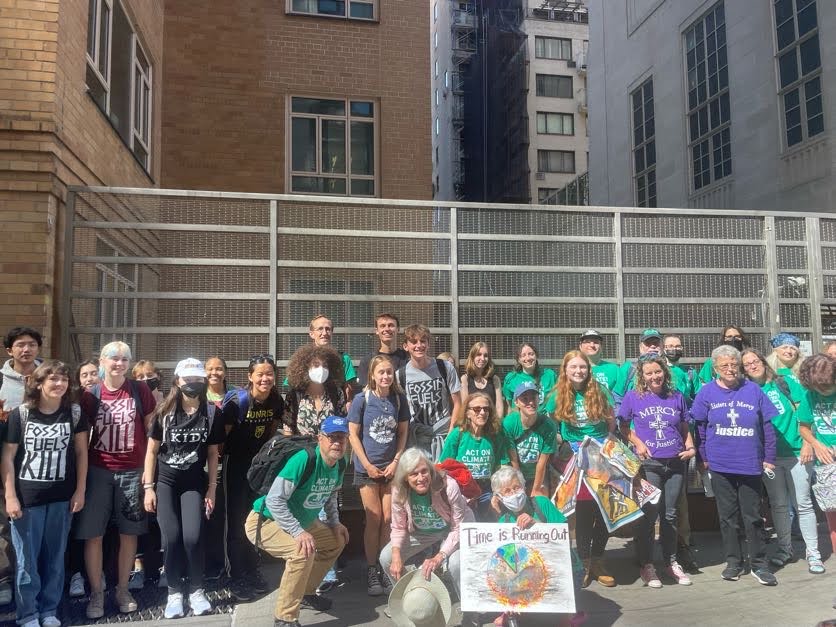Venue, Environmental Justice Debated at LNG Hearing
February 5, 2018
PROVIDENCE — Attendees entering Veterans Memorial Auditorium last Wednesday night were greeted with a pat-down and bag search, and were prohibited from carrying in computers, food and beverages.
Several of the 60 or so on hand for the Jan. 31 “listening session” hosted by the Rhode Island Department of Environmental Management (DEM) complained about the rigorous security measures and location of the venue, on the Avenue of the Arts near the Statehouse and DEM headquarters.
“If this is some sort of statement on how seriously DEM takes public involvement in their processes then it’s a joke. A total and complete embarrassment,” said Aaron Jaehnig of the Rhode Island Chapter of the Sierra Club.
Others noted that prior hearings were equally uninviting for residents from the South Providence and Washington Park neighborhoods, where a waterfront liquefied natural gas (LNG) facility has been proposed. One of the project’s previous hearings was held at the city’s police headquarters.
“You must recognize that you are not the people you are representing,” said Wassa Bagayoko of Washington Park to DEM’s all-white board from the Office of Water Resources.
Opposition to the LNG cooling plant and work on nearby contaminated land at the city’s port has been vigorous, but has yet to slow development. On Dec. 12, the state Coastal Resources Management Council approved the National Grid project.
Many fear that disturbing the contaminated soil at the 42-acre site would worsen the area’s already poor air and water conditions. The Port of Providence on Allens Avenue hosts some of the biggest industrial polluters in the state. Pollution from these businesses, combined with high truck traffic and pollution from Interstate 95, has earned the neighborhood an “asthma hot spot” designation.
Concern about additional pollution generated by the proposed LNG facility is justifiable. The site was contaminated from 1910 to 1954, when it was primarily a coal gasification plant. Coal gasification was common for decades but highly harmful, as residents of North Tiverton learned. The process left behind hazardous waste and carcinogens such as arsenic, lead and benzene.
“We are heavily burdened with the toxins in this neighborhood,” said Monica Huertas, an organizer with the opposition group No LNG in PVD.
Huertas, who lives a quarter-mile from the project site, speaks regularly at hearings about the health and safety risks of the LNG project. She sometimes brings her young children and explains the challenges residents face to attend. Her 3-year-old daughter suffers from asthma and must stay indoors during high-pollution days.
“We cannot trust National Grid to keep us safe,” Huertas said.
Ken Payne, a veteran energy policy expert, said a project like this would never be built in more affluent towns such as Barrington and Bristol. The industrial waterfront is an example of unwanted land use that creates poor living conditions and “residential racism” based on income.
Payne said the Office of Water Resources has a small role in the approval of the project but could change its course by taking into account a moral obligation to address the social inequity.
“Don’t our regulations treat people who live in all places the same way?” Payne asked.
Bagayoko noted that the neighborhood has the 11th-highest asthma rate in the country. Digging up polluted dirt will only make the area’s air and water worse. She and others noted the risk of fires, explosions from accidents, and contamination from increased rain and flooding.
“Democracy works when the people are educated,” Bagayoko said. “The people are educated and the council is not listening.”
National Grid hopes to have the liquefaction facility built and operational by 2020. Air- and water-pollution permits are still outstanding from DEM. The Federal Energy Regulatory Commission (FERC) is expected to issue an environmental assessment by the end of March. Other federal permits are expected 90 days after FERC issues its report.
DEM’s Office of Water Resources is reviewing National Grid’s application to build soil and erosion containment systems at the liquefaction site, as well as a stormwater treatment system and a system to discharge water into the Providence River.
Public comment for the project is open until Feb. 15.
Categories
Join the Discussion
View CommentsRecent Comments
Leave a Reply
Related Stories
Your support keeps our reporters on the environmental beat.
Reader support is at the core of our nonprofit news model. Together, we can keep the environment in the headlines.
We use cookies to improve your experience and deliver personalized content. View Cookie Settings




DEM’s actions on the presentation and implementation of these public meetings seems heavily influenced, orchestrated, and dictated by National Grid. The whole idea of having citizens go through security and then be deprived of computers, water, and food is vulgar and bears the bones of authoritarian oppression. There have been no incidents of citizens posing any threats to panel members at any of these hearings. Apparently people raising their vices and challenging authority is viewed as threatening by those not used to being challenged. Those that serve the public should be professional and accept that some disagreement and public outcry may result from their actions and policies And let’s not forget the absurd location. The Vets venue? There is absolutely no free parking in that area unless someone walks up the hill to the Dept of Administration/DOH lot. At night. In the dark. It should have been scheduled in the affected neighborhood. Or even at the Dept. of Administration cafeteria space. This bullying of the the public exercising their Constitutional rights reflects poorly on Janet Coit, the Director of the DEM as well as Governor Raimondo.